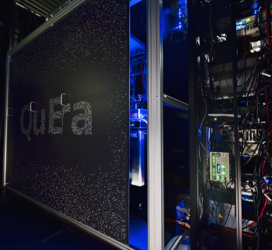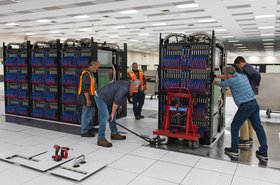Japanese research institute Riken is to deploy an IBM quantum computer at its facilities in Kobe.
US quantum computing firm QuEra is also set to deploy an on-premise system at a research organization in Japan.
Riken to deploy IBM quantum computer
IBM this week announced an agreement to deploy an IBM Quantum System Two quantum computer at the Riken Center for Computational Science in Kobe, Japan.
The quantum system – to be powered by a 133-qubit Heron processor – will be colocated and integrated with the organization’s existing Fugaku supercomputer. Timelines for deployment weren’t shared.
“Riken is committed to developing system software for quantum-HPC hybrid computing, by leveraging its comprehensive scientific research capabilities and experience in the development and operation of cutting-edge supercomputers, such as Fugaku,” said Dr. Mitsuhisa Sato, director, quantum HPC collaborative platform division, Riken Center for Computational Science.
“As the first quantum system that will directly connect with the Fugaku classical supercomputer, IBM's agreement with Riken marks a monumental milestone in the journey towards a future defined by quantum-centric supercomputing,” added Jay Gambetta, IBM fellow and VP, IBM quantum. “This work will advance the industry towards a modular and flexible architecture that combines quantum computation and communication with classical computing resources, so that both paradigms can work together to solve increasingly complex problems."
Launched in 2020, the Fujitsu-made Fugako was the world’s fastest supercomputer when it launched. Dethroned by the US government’s Frontier system in 2022, it is currently the world’s fourth most powerful system, capable of 442 petaflops (sustained, Linpack) with a theoretical peak of 537 petaflops. It requires just under 20MW to operate.
Riken is being supported by funding from the New Energy and Industrial Technology Development Organization (NEDO), an organization under Japan’s Ministry of Economy, Trade and Industry (METI).
Riken has already deployed two Fujitsu-made quantum computers and has signed a deal to procure a system from Honeywell’s Quantinuum (IBM is also an investor).
A SambaNova DataScale system is also being integrated into Fugako.
QuEra to deploy quantum computer for AIST in Tokyo
This week also saw QuEra, a US quantum computing startup, announce it will deliver a quantum computer to the National Institute of Advanced Industrial Science and Technology (AIST) in Tokyo.
The neutral-atom technology-based company announced it has been awarded a 6.5 Billion JPY contract (approx. $41M) by AIST to deliver a quantum computer that will be installed on-premises alongside the Nvidia-powered ABCI-Q supercomputer.
Takuya Kitagawa, president of QuEra, said: "We are honored that AIST has chosen our technology for installation in Japan. This partnership highlights our mutual dedication to advancing science and technology, setting new standards in computational research with a focus on quantum and AI applications. We are excited about working with Japanese entities and companies on new horizons with quantum computing."
QuEra’s gate-based computer is scheduled for on-premises installation in 2025.
AIST is one of Japan’s largest public research organizations. Built by Fujitsu, ABCI-Q will be powered by more than 2,000 Nvidia H100 Tensor Core GPUs in more than 500 nodes, interconnected by Nvidia’s Quantum-2 InfiniBand. Announced in March 2024, it is set to be deployed early next year.
Masahiro Horibe, deputy director of G-QuAT/AIST, added: "Installing QuEra’s cutting-edge technology alongside our existing computing infrastructure is a crucial step in Japan’s quantum initiatives. This collaboration will enhance our computational capabilities and drive the development of practical applications in fields like AI, energy, and biology."
Previously kept in dedicated labs and offered access via the cloud, quantum computers - whether supercooled or laser-based - are increasingly being deployed on-premise. Whether able to fit into a standard rack or larger bespoke housing, a growing number are being rolled out to supercomputing centers, while several have also been installed in colocation facilities.








